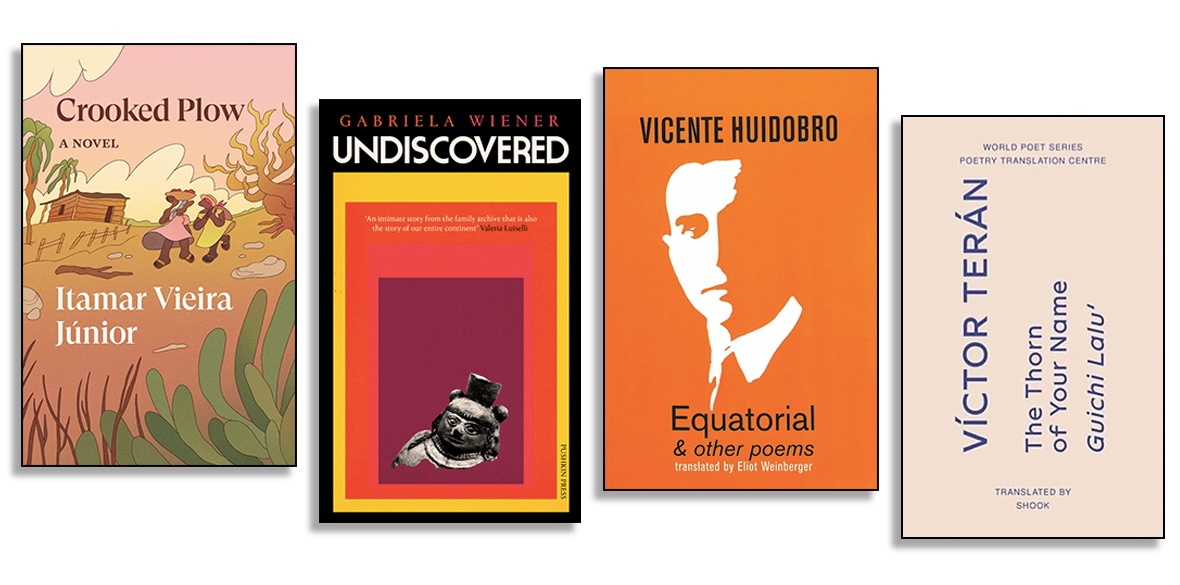This is the last article you can read this month
You can read more article this month
You can read more articles this month
Sorry your limit is up for this month
Reset on:
Please help support the Morning Star by subscribing here
THE opening scene in Crooked Plow (Verso, £10.99), Brazilian author Itamar Vieira Junior’s debut novel, serves as a metaphor for the whole book.
In a certain farming community in the north-eastern region of Brazil, there is a violent incident involving a kitchen knife. The incident has a profound impact not only on the people directly affected by it but also on the entire community, which was descended from Afro-Brazilian slaves. For generations, this community of subsistence farmers has been exploited, subjugated and subjected to racial discrimination.
The book, beautifully translated by Johnny Lorenz, delves into the lives of Bibiana and Belonisia, two sisters, along with their family and wider community, living in the floodplains of the imaginary Agua Negra. It is a plantation situated in the region of Bahia, the author’s birthplace, occupied by poor farmers exploited by the Peixoto family.
This is a story about wealthy and powerful landowners in Brazil who profited from the labour of their tenants without ever working the land themselves. The narrative arc follows the life, daily struggles, and suffering of the two sisters, as well as their grandmother Donana, their hard-working father and spiritual leader of the community, Zeca Chapeu Grande, alongside his wife Salustiana Nicolau: “Suffering was the secret blood running through the veins of Agua Negra.”
The story is narrated from multiple perspectives. It begins with Bibiana’s point of view, followed by Belonisia’s, and concludes with a Jare spirit who takes control of several characters’ bodies, serving as an all-knowing narrator. Exploitation, suffering and discrimination are pervasive themes throughout the story, as they flow beneath the surface of everything that happens in Agua Negra.
The book is a strong contender for this year’s International Booker Prize and is one of my top picks to win the prestigious accolade.
Undiscovered (Pushkin Press, £14.99) by Peruvian writer and journalist Gabriela Wiener was longlisted for the same award but unfortunately didn’t reach the next stage. However, it should have because the book is a sharp and insightful memoir about self-discovery, postcolonialism, sexual desires, and polyamory in the 21st century.
We follow the narrator as she begins searching in an ethnographic museum in Paris about her great-great-grandfather, Austrian colonial explorer Charles Wiener. It is also a journey of self-discovery that involves the narrator’s father, recently deceased, her partners, and her relationship with her own ethnicity and history as a Peruvian migrant living in Madrid.
This is one of the best books I’ve read recently about deconstructing postcolonialism, the pervasive forces of patriarchy and the search for identity, mixing personal experiences with historiographical material with a sardonic tone and, at times, a touch of black humour. There are moments of great discovery, such as when she reads passages from Charles Wiener’s book Peru and Bolivia: “The irritation I feel at the cruel, colonial, and racist passages in the books Wiener wrote about my culture gives way to a sudden compassion for unwittingly anti-academic, self-aggrandising stance.”
Gabriela Wiener’s book ultimately triumphs due to her forceful writing, lucid ideas, and an irrepressible quest for a decolonised present.
Eliot Weinberger has done an exquisite job translating Chilean avant-garde poet Vicente Huidobro in his latest book Equatorial & Other Poems (Shearsman Books, £12.95).
“Era el tiempo en que se abrieron mis párpados sin alas/Y empecé a cantar sobre las lejanías desatadas” is translated as “It was the time when my eyelids opened still wingless/ And I began to sing of far-off places unravelling.”
So begins one of the most arresting poems by Huidobro, Equatorial, dedicated to Pablo Picasso and originally published in 1918 (there is also an alternative version included in the book), evoking the Great War — “The cities of Europe/ Go out one by one” — and turning the sky into a metaphor for fire, and the streets where people wander, a permanent prison.
This collection also comprises “Mirror of Water,” which opens with one of my favourite poems by Huidobro, Ars Poetica: “Let poetry be like a key/That opens a thousand doors.”
Another great addition to Shearsman’s lovingly translated collection of books by the great Chilean poet.
The latest Poetry Translation Centre’s World Poet Series book is The Thorn of Your Name (PTC, £9) by Zapotec poet Victor Teran. David Shook has beautifully translated the poet’s newly selected work.
Teran, who writes in the indigenous language of Zapotec, was born in Juchitan, Oaxaca, a city situated on that section of the Pan-American Highway linking Mexico City with Guatemala City and on the railroad leading from the trans-isthmian route to the Guatemalan border. This is a place the poet sings to in many of his poems such as Juchitan, My Bride: “The arms of your peasants and fishermen/ are made of steel,/ the feet of your women, hummingbird wings./ Big Juchitan, small Juchitan:/ curlew that sings and dances in Zapotec,/ loving mother confident to comfort her children,/ ancient son of the clouds, my grandfather.”
This short but scintillating collection also includes love poems and poems of political messages, like Soldiers, dedicated to Victor Pineda Henestrosa, a teacher and advocate for rural workers, kidnapped by the Mexican Army on July 11 1978.
“Why,/ soldiers,/ did you kidnap/ a man whose word is as true/ as a thorn,/ who yearns for/ my Juchitan de las flores?”
There is an illuminating introduction by Shook, who has translated Teran since 2008. This is a highly recommended book written, as Shook rightly explains, by one of Mexico’s most important Indigenous voices “who has long advocated both in his writing and in his work as a language activist for the recognition of the intrinsic value of the Zapotec language and its expanded use in every domain of contemporary Indigenous life.”











